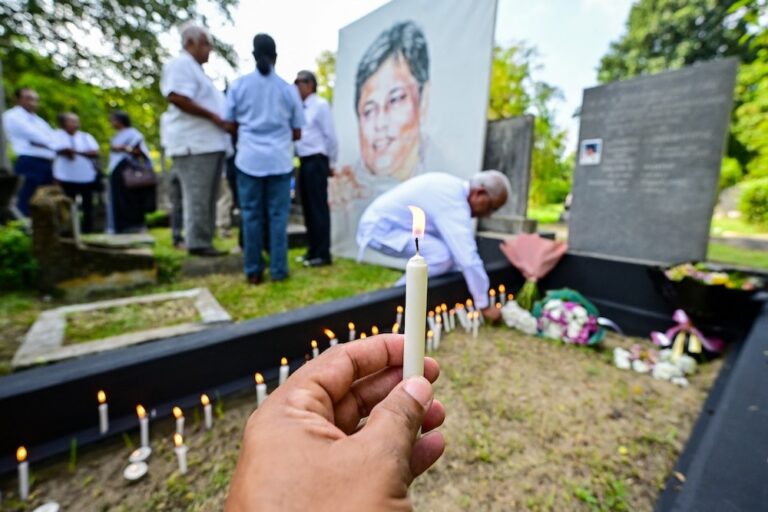The IFJ condemned a 20-year jail term against J.S. Tissainayagam and accused authorities of abusing anti-terror laws to silence peaceful critics.
IFJ condemns brutal jail term for Sri Lankan journalist Tissainayagam
(IFJ/IFEX) – 31 August 2009 – The International Federation of Journalists (IFJ) today condemned a 20-year jail term against senior Sri Lankan journalist J.S. Tissainayagam as “brutal and inhumane” and accused Sri Lankan authorities of abusing anti-terror laws to silence peaceful critics.
The High Court of Colombo today convicted Tissainayagam, a prominent Tamil journalist, of “causing communal disharmony” and “receiving money from Tamil Tiger rebels to pay for his website”.
He was detained last year and later charged with inciting violence in articles in his magazine, the North Eastern Monthly, which has since closed. The landmark ruling makes Tissainayagam one of a handful of journalists in the world to be convicted of terrorism for the content of their journalism.
“This man has been victimised for no more than holding the Government to account and giving voice to legitimate if critical opinion,” IFJ General Secretary Aidan White said. “The sentence is disproportionate, brutal and inhumane and is a chilling reminder of how dangerous Sri Lanka has become for independent journalists.”
The IFJ is one of the international press freedom and rights groups that have been campaigning for Tissainayagam’s release and for Sri Lanka to tone down anti-terrorism legislation which is being used against government critics.
On March 7, 2008, Tissainayagam was detained without charge by the Terrorist Investigation Division (TID) of the Sri Lankan police. At the time he was the editor of an online newspaper, OutReach.sl.com. He was held for more than five months before being charged with publishing and distributing a magazine containing material alleged to have brought the government into disrepute.
Earlier this year, United States President Barack Obama named Tissainayagam as an “emblematic example” of the “distressing reality” of courageous journalists who face intimidation, censorship and arbitrary arrest for their professional work.
“The IFJ is anxious over the welfare of Tissainayagam in prison,” White said. “Sri Lankan authorities must ensure he is housed in a safe environment and has access to medical assistance for his deteriorating health.”
The Colombo High Court found Tissainayagam guilty of inciting ethnic and racial disharmony, of printing and publishing such material, and of collecting money for the North Eastern Monthly from NGOs.
However, defence lawyers said there was no evidence of attempts by Tissainayagam to stir up religious, racial or regional conflict. He was being accused only because he is a Tamil, they said, and because of his criticism of government and state security forces. The charges against Tissainayagam and two colleagues, Jesiharan and Valarmathi, were laid under the Prevention of Terrorism Act (PTA), a draconian and “temporary law” that has remained on Sri Lanka’s statute books since it was introduced in 1979.
Since Tissainayagam’s arrest, the IFJ has been concerned about his treatment in detention, including how he was tortured to make a confession. He was held without explanation for more than 150 days, during which time he was reportedly tortured and denied medical treatment. Court hearings were postponed arbitrarily and a human rights case lodged by his lawyers was not properly investigated.
The IFJ says Tissainayagam’s prosecution and conviction is symbolic of crumbling press freedom in Sri Lanka, where at least eight journalists have been killed since 2007. Others have been beaten, harassed, detained and threatened with death. Many journalists have been forced to leave the country for their safety.
“We will not give up our campaign for Tissainayagam,” said White. “He should be released and this terrible injustice undone immediately.”


